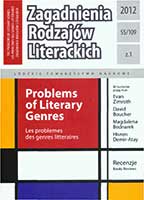Der zumutbare Gesang: Musik in Ingeborg Bachmanns Horspiel Zikaden
This Singing is Essential: Music in the Radio Broadcast Die Zikaden (1954/55) by Ingeborg Bachmann.
Author(s): Joanna FirazaSubject(s): Literary Texts
Published by: Łódzkie Towarzystwo Naukowe
Keywords: cicada myth; island motif; radio broadcast; literary utopia; music in literature; critique of language
Summary/Abstract: Being part of a critical reflection on language, music constitutes the works created by Ingeborg Bachmann. It results from the writer’s conviction, rooted in romantic tradition, that music is superior to language and as such should be used to „save” language in the process of constructing an interdisciplinary dialogue between literature and music and in the process of searching for new ways of expression. The aesthetics of a radio broadcast Die Zikaden (The Cicadas), elaborated in collaboration with a composer Hans Werner Henze, is based, to a large extent, on using sound not only as background but as an integral part of the whole regarding content and structure. Criticizing art which is aseptic and remote from the realities of life, The Cicadas‘ primary message surpasses its epoch. References to texts from the 50s can be traced next to certain analogies in the usage of sound. Das Ende einer Welt (1952) by Wolfgang Hildesheimer and Traume (1953) by Günter Eich anticipate a functionalization of cicada sound in Bachmann’s works. Constructing an unsettling dialectical figure of memory and oblivion, harmony and dissonance, the author enters into a polemic with a cicada myth which goes back to the times before Homer and which was popularized by Platon in The Phaedrus. In this way, the symbol surpasses its pure aesthetics and acquires the status of socio-critical appeal. Nevertheless, the function of art (here: music) in The Cicadas is not limited to the slightly moralizing message. Distinguished from Bertolt Brecht, who perceived a rational power in music, Bachmann comprises its irrational aspect and emphasizes its potential. Cicadas singing as a metaphor of awakening to responsible existence excludes a possibility of being enchanted by music or being lost in it. It does not, however, exclude emotionality in itself. Bachmann entwines cicadas’ singing into her post-utopian faith in the causative power of literature.
Journal: Zagadnienia Rodzajów Literackich
- Issue Year: 55/2012
- Issue No: 1
- Page Range: 125-141
- Page Count: 17
- Language: German

